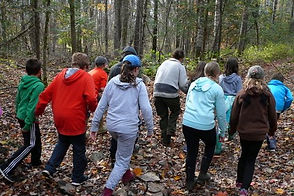Laurie Lynn Clark
Bereavement Education
Trauma-Informed Somatic Practitioner
Nature Connection Youth Programs
Early Childhood Education
Laurie Lynn Clark, RECE
Registered Early Childhood Educator
Bereavement Companionship/Consultation
Advocacy:
Bereavement Education
in the Home and Workplace
Normalizing Feelings of Grief
Online Group Sessions for Educators/ Caregivers
Bereavement Education
for youth and their caring adult
Educators come together to share and reflect on
children's individual grief journeys, recognizing that
every child experiences loss differently.
Through thoughtful discussion
and collaboration, they work to identify
compassionate, personalized approaches
that meet each child’s unique emotional needs.
Bereavement Education Workshops
Let's talk about death...
All children should receive grief education at school.
Eco-Literacy with Youth, Nature Connection
Grief Education in Nature:
Integrating Emotional Literacy
and Nature-Based Learning
(Grades K-8).
Invite the Topic of Grief
into the Outdoor Classroom
Metaphors and Reflection
Natural cycles — such as seasons, growth, decay, and renewal — provide tangible metaphors for life, loss, and resilience. Children can explore grief through symbolic activities like planting seeds, observing changing leaves, or caring for animals, the science of mycelial networks in growth, decay and renewal, which can help them understand loss as a natural part of life.
Grounding and Emotional Regulation
Being in natural spaces — forests, parks, gardens, or near water — helps children feel physically and emotionally grounded. The sights, sounds, and textures of nature can calm the nervous system, reduce anxiety, and create a safe environment for expressing feelings of grief.
Somatic Awareness
Nature encourages children to notice bodily sensations and movement. Running, climbing, or simply walking barefoot on grass can help them release tension, connect with their bodies, and process emotions somatically rather than only cognitively.
Restorative Communication Strategies in Group Relational Dynamics
Earth stewardship and eco-compassionate relationships across all areas of learning. Students explore how respect for the natural world supports human growth and community well-being.
Core Circle Principles
-
Every voice is equal; leadership is shared.
-
Speak from the heart using “I” statements.
-
Listen actively with empathy and without judgment.
-
Honor both individuality and collective wisdom.
-
Hold space for diverse perspectives with respect and appreciation.
Resources
Room for an Elephant | Child Bereavement UK-
https://www.youtube.com/watch?v=hzSGwB6-KzA:
‘Room for an Elephant’, which illustrates a specially written poem, aims to help raise awareness of how lonely grief can be and to encourage others to connect with bereaved friends with greater compassion and understanding.
To find grief curriculum for schools, visit Child Bereavement UK : www.childbereavementuk.org.
Reference Book: Trauma Proofing your Kids.
Trauma-proofing Your Kids: A Parents' Guide for Instilling Joy, Confidence, and Resilience by Peter Levine, Maggie Kline

Above: 2023-Restorative Sharing Circle Workshop @ Algonquin College-ECE Program



Above: 2016/2018 Building Relationships in Restorative Communication Circles.
Elementary Schools' indoor and outdoor classrooms - Perth, Ontario.
Above: 2018 Earth Stewardship Sharing / Empathy Circles with Youth-
The Outdoor Classroom. Walking Silently. Solo Sit Spot (Quiet Contemplation & Reflection)




Above: 2018- Algonquin College ECE Program: Restorative Sharing Circle Workshop in the Indoor & Outdoor Classroom.


Left/Above: 2023: Algonquin College ECE Program Students remembering what it is like being kids at play. Sensory Awareness Activities.
Acknowledging First Nations Pedagogy – Talking Circle
"Talking Circles or Circle Talks are a foundational approach to First Nations pedagogy-in-action since they provide a model for an educational activity that encourages dialogue, respect, the co-creation of learning content, and social discourse. The nuance of subtle energy created from using this respectful approach to talking with others provides a sense of communion and interconnectedness that is not often present in the common methods of communicating in the classroom. When everyone has their turn to speak, when all voices are heard in a respectful and attentive way, the learning atmosphere becomes a rich source of information, identity, and interaction." (Reference: http://firstnationspedagogy.ca/circletalks.html)